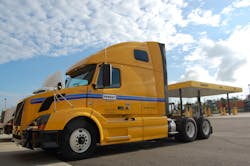Bill Combs, director of connected fleet services at Penske Truck Leasing, believes that although trucking is beginning to confront what many in the industry describe as a “tsunami of data” from a wide variety of systems, he thinks putting the “right people” in charge of handling the “right data” will be the critical factor in preventing motor carriers from being overwhelmed by information.
“We can do an awful lot with the data coming from today’s trucks, especially on the maintenance side,” he explained during a presentation during the Connected Fleets USA conference in Atlanta last week.
“But when you are creating KPIs [key performance indicators] and other data ‘values,’ you need the right people in place creating those values,” he stressed.
The key distinction today, to Combs’ mind, is between what he calls “raw data” versus data analysis.
“There is no real value in ‘raw data’ by itself,” he explained. “For example, take odometer readings; that single data point can be used 30 different ways depending on how it’s analyzed: for maintenance billing, for fuel mileage tax reporting, etc.”
That’s why having the “right people” work with raw data is critical, Combs said. “I describe it this way: I can have a pediatrician clean my teeth, but it would be better to have a dentist do it,” he noted.
Harold Leitner, vice president of business development for GPS Insight, offered another angle on the “raw data” issue when it comes to safety metrics such as hard braking.
“So what exactly is ‘hard braking’? Is it a 5 mph [mile per hour] deceleration? A 7 mph deceleration? That varies widely today among systems,” he explained. “That’s why actionable data is really what customers are looking for.”
Dan Lehman, vice president of business and corporate development for SmartDrive Systems, added that “visualization” such data streams is only half the information battle for fleets.
“Visualization does not mean value to the customer,” he explained. “It’s making the customer understanding the value of the data and then taking action on what analysis of the data is telling them; that is the real value.”
Lehman added that customers are “much more intelligent about their operations than we will ever be.” Thus, the role of information technology suppliers is to enable fleets to get better insights into their operations from the data being provided, he said.
“That’s why we see ourselves as an ‘enabler’ for our customers,” emphasized Penske’s Combs. “We’re in the middle of the ‘value chain’ between the truck OEM and the customer, so our job is to help customers use the data from the trucks to create efficiencies. It’s our responsibility to help achieve them.”
About the Author
Sean Kilcarr
Editor in Chief
Sean Kilcarr is a former longtime FleetOwner senior editor who wrote for the publication from 2000 to 2018. He served as editor-in-chief from 2017 to 2018.
